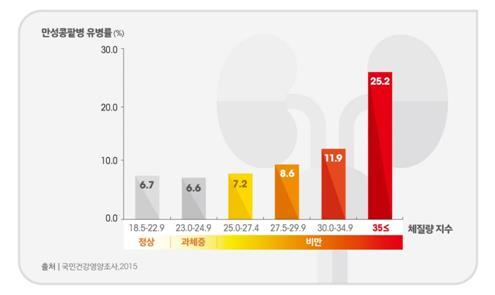Obesity sharply increases the risk of developing chronic kidney failure, a report said Thursday, urging obese people to undergo regular testing to prevent the disease.
In the report released to mark World Kidney Day, the Korean Society of Nephrology said chronic kidney disease has been found to be 3.8 times more likely to develop in super obese people with a body mass index of 35 or higher.
 |
(Yonhap) |
The prevalence of kidney disease for super obese people stands at 25.2 percent, compared to the corresponding figure of 6.7 percent for those with normal weight, said the report based on a national survey on health and nutrition taken in 2015.
BMI is a measure of body fat based on height and weight. A BMI of 25 or over is regarded as obese in South Korea.
"Obesity usually entails hypertension, diabetes and hyperlipidemia, which affects the development and progression of chronic kidney failure," said Cho Sang-kyung, spokesman for the society. "Obese people should get tested for kidney disease on a regular basis."
However, a very small number of people receive the medical test for chronic renal disease. According to a survey of 500 people, taken by the society, only 4 percent of the respondents said they have been tested for the disease.
The low test rate has resulted in high costs of treating chronic kidney failure, which is hard to find at an early stage and requires a long period of dialysis and other treatments once it occurs.
In 2015, the cost of treating some 160,000 chronic kidney failure patients totaled 1.57 trillion won, making it the second most expensive disease in South Korea. (Yonhap)






![[Herald Interview] 'Trump will use tariffs as first line of defense for American manufacturing'](http://res.heraldm.com/phpwas/restmb_idxmake.php?idx=644&simg=/content/image/2024/11/26/20241126050017_0.jpg)
![[Exclusive] Hyundai Mobis eyes closer ties with BYD](http://res.heraldm.com/phpwas/restmb_idxmake.php?idx=644&simg=/content/image/2024/11/25/20241125050044_0.jpg)
